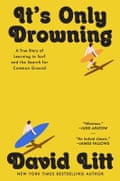What do men want? Democrats need to know after their election drubbing by Donald Trump and the “manosphere” last year. They have responded by commissioning “Speaking with American Men”, a strategic plan that will study “the syntax, language and content that gains attention and virality” in online spaces.
News of the two-year $20m project reinforced critics’ view that Democrats have become the party of an aloof, college-educated liberal elite whose pursuit of working class men resembles a Victorian explorer wielding a butterfly net. Which makes the publication of David Litt’s book, It’s Only Drowning, a timely contribution to Democrats’ ongoing post-mortem.
Litt is a former senior speechwriter for Barack Obama dubbed “the comic muse for the president” for his work on White House Correspondents’ Association dinner monologues. The 38-year-old has written speeches and jokes for athletes, chief executives and philanthropists and was head writer and producer in the Washington office of the comedy studio Funny or Die.
It’s Only Drowning, his third book, centres on an improbable friendship that develops between Litt, a Yale-educated liberal with a fear of sharks, and his brother-in-law Matt Kappler, a tattooed truck driver who listens to podcaster Joe Rogan and never registered to vote.
Their chasmic differences in background, education, ideology and lifestyle initially seem unbridgeable but, when Litt asks Kappler to help him learn how to surf, the shared experience provides neutral ground for connection.
“What started as a surfing book became a story about basically a will-they won’t-they?, except it’s whether an Obama speechwriter and a Joe Rogan superfan can become friends,” Litt says in an interview at the Guardian’s office in Washington. “Like a lot of Democrats, my natural inclination is to be a little annoying and condescending. I certainly wasn’t doing that when I was the one who desperately needed to learn from him.”

Litt, who divides his time between Washington and Asbury Park, New Jersey, describes himself as a high-functioning, high-anxiety person who experienced situational depression during the coronavirus pandemic. He had a feeling of overwhelming dread, difficulty getting out of bed and found himself endlessly doomscrolling.
His wife Jacqui’s brother, by contrast, seemed to be thriving. Kappler is a guitar player, a motorcycle enthusiast and a daredevil surfer. Litt reflects: “I had always thought of him as a crazy person, and I still do, but he was able to deal with the ups and downs of life in a world that’s on fire in a way that I began to envy.
“He did well during the pandemic and he seemed resilient in a way that, to be totally honest, I didn’t. I definitely was not about to get tattoos or try to drive a truck because I would bump into things, but I could see myself trying to surf and that’s what happened.”
It would not be easy. At the age of 35, it required developing new muscles and confronting intense fear and humiliation. Still, Litt moved to the Jersey Shore and enlisted Kappler to help with surfing lessons. After months of struggle, he set the ambitious goal of riding a big wave in Hawaii.
Surfing became a metaphor for confronting fear, both physical and existential, and an antidote to Litt’s habitual overthinking. He says: “Weirdly, the feeling I get, that sense of dread when a wave is about to crash down right on top of me, is actually somewhat analogous to the feeling I get when reading the news these days. It’s that sense of looming disaster and there’s nothing you can do about it.”
And most importantly, Litt came to consider Kappler a friend. “One of the only things more difficult than learning to surf is making a new friend in your 30s, so I feel like I might be even more proud that I was able to accomplish that than riding an overhead wave on the North Shore.”
As he tells this story, Litt reflects on America’s deep political and cultural divisions and how they were exacerbated by the pandemic. Differences in taste and lifestyle become “identifiers” declaring political allegiance. Litt admits that, had Kappler been a friend rather than family, he would probably have cut off contact after learning that Kappler refused the Covid shot.
“He played electric guitar in a ska band that is a big deal on the Shore; I played ultimate frisbee. He was into death metal and I was into Stephen Sondheim. So we never had anything in common. In the run up to the pandemic all of these differences weren’t always political but then somehow they started to feel like they were telling us what team we were on. It felt like we’d been drafted into opposite sides of the culture war.”
Litt does not pretend that there was a Hollywood ending in which he and Kappler found common ground and changed each other’s minds. But he does argue in favour of shared activities that allow for connection and understanding between individuals with differing views.
“What we found was this neutral ground. Surfing is a space that is not politically coded and you can talk about something that isn’t one of the gazillion fault lines in our society right now. It’s hard to find those spaces but, for the exact same reason, it’s worth trying.

“I heard from a lot of people in the run-up to this book coming out who said, ‘I have a friend or family member where politics is tearing us apart. We can’t talk about anything in the news and how do I convince them?’ What I would say now is talk about something else. Don’t talk about what’s in the news.
“Start by looking for that neutral ground and forgetting about this idea of common ground, because the reason it feels like we have no common ground is that we don’t. We just disagree on a lot of important things as a society.”
Litt knows that, had Kappler been registered to vote, he would certainly not have done so for Democratic nominee Kamala Harris. Back in 2016, Kappler said he would have backed either Trump or Bernie Sanders because they were the most entertaining.
Litt says: “Truly the biggest divide between us politically is that I think about politics a lot and that’s part of how I define myself. Matt watches the news, he cares about what’s going on in the world, but that’s not his identity. He’s not a political person.
“One of the problems that Democrats have right now is we’re very much the party of news junkies and most Americans are not news junkies.”
Celebrity politics and cultural influence have moved towards Republicans and the likes of Rogan and Elon Musk, who appeal to anti-establishment sentiment and claim to prioritise common sense over political parties. A new generation of rightwing podcasters and influencers started out as entertainers and latched on to issues later.
“Democrats are still lagging.” Litt says. ‘The new media voices that are developing, many of them are great, but they tend to be political first and entertainment second, or politics as entertainment, and so they don’t appeal as much to people who don’t find politics entertaining and those are the voters we’re going to need in ‘28.”
Democrats also have a well documented class problem. It has come to be seen by many as the party of Hollywood celebrities and college-educated elites, with a whiff of contempt for blue collar workers in the heartland, summed up by Hillary Clinton’s dismissal of half of Trump supporters as a “basket of deplorables.”
The party’s perceived shift toward identity politics and social justice issues alienated some working class voters who once formed its base. Ahead of the 2016 election, Senator Chuck Schumer declared: “For every blue-collar Democrat we lose in western Pennsylvania, we will pick up two moderate Republicans in the suburbs in Philadelphia.”
It turned out to be bad maths. Last November Republicans swept the White House and both chambers of Congress. Trump won 56% of voters without a college degree, compared with 42% who favoured Harris, a shift from 2020 when Trump and Joe Biden were roughly even.
Litt points out the homogeneity of Democratic circles and the lack of organic relationships with working-class people, particularly those without college degrees. This disconnect hinders their ability to understand their issues or effectively communicate.
Recalling his time volunteering for Harris’s ill-starred election campaign, he says: “I would sometimes be on conference calls and people would talk about a policy or message and say, ‘Do we think this is going to work? Do we think this is going to be effective?’ I would basically say, well, let me go surfing and find out.
“Nobody else said, ‘Oh, let me go talk to my working class friend,’ because Democrats often do not have working friends who don’t have college degrees. The people who are in office, and the people who work for those who are in office, almost all are college educated and almost all their friends are college educated.
“You have Democrats sit in rooms where literally everyone has a college degree, and they say, how come people without college degrees don’t feel like we’re thinking about them or that we’re welcoming to them? Well, look around the room.”
Litt acknowledges that he is writing about a friendship with one other white man, the smallest possible sample size, making it hard to draw sociological conclusions about working class people of colour.
But he also notes that Republicans have sought to “repolarise” the country on educational and culture war lines while making race less important in determining how people vote. Polls show that Trump did make big inroads with Latino men and, to a lesser extent, with African American men.
Litt says: “I don’t know that race stopped mattering but I do think there was a Democratic view that race mattered so much more than anything else, especially for people who are not white.
“What we saw is very clearly no, that’s not true and was maybe not the most empirically based attitude to have. The base of the Democratic party is still Black women but I do think there was some some of that racial depolarisation.”
Democrats do have a strong policy agenda for blue collar workers but have failed to communicate it, Litt argues. His friendship with Kappler will not explain everything. But he offers it as a start for a party that somehow allowed Trump – a millionaire businessman who cuts taxes for the rich – to steal its clothes.
“If you had asked me three years ago, do you have a lot to learn from your brother-in-law, I would have said not really, and one of the things I had to learn was that’s a deeply obnoxious attitude. I’m still a professional Democrat – I can still be plenty annoying – but I think I am less self-righteous than I used to be. And it turns out life is more fun and you’re more persuasive that way. So why not?”

 German (DE)
German (DE)  English (US)
English (US)  Spanish (ES)
Spanish (ES)  French (FR)
French (FR)  Hindi (IN)
Hindi (IN)  Italian (IT)
Italian (IT)  Russian (RU)
Russian (RU)  5 hours ago
5 hours ago
























Comments